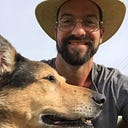Epistolution Musing №1: Basal Cognition
Dear Friends,
This letter is part of a weekly series of brief thoughts I would like to share with you, either because I’ve come across your related work in biology or because you’re a person I like. I discovered an interesting problem in 2019, a problem I can’t forget. Epistolution is the unknown biological mechanism necessary to explain purposive activity that can’t be accounted for by genetic influences.
We live in an age of large biomedical research investments. Today small organic molecules of all sorts are manipulated in vast numbers in mechanized large-scale experiments, full genetic sequences are read, catalogued, and analyzed en masse by artificial intelligence, detailed sociometric personal data from nearly every human on earth is traded as a bulk commodity, and staggeringly large sets of computations can be ordered for a trivial fee from your pocket-sized device. So why is it still impossible to make even the very simplest form of life from scratch in a lab?
If you doubt that epistolution is possible, consider this simple example: Two dark-haired fourteen-year-old girls, Anna and Amanda, are teenagers who happen to be monozygotic twins. This year they are assigned to different countries in a study abroad program. One is sent to Paris and the other to Naples for a year. When they return home to New York the next spring, one twin speaks fluent French and the other speaks Italian with a Neapolitan accent. What accounts for this difference? What is it, biologically speaking, that has caused one twin to learn French and the other Italian? Without genes, there would be no girls at all, but since the twins share the same genome, it can’t be argued that the manner of their speech is specified in their genes. It also can’t be the result of random interactions with the stochastic outer environment, since of course it was predictable that they each learned a particular language. Initially, they neither spoke a common, gene-derived language comprehensible to just themselves as twins nor did they speak random gibberish. They spoke English, like most New Yorkers. Now they speak English and French or Italian, respectively. The changes that have occurred over the study-abroad year are adaptive; each twin has obviously adapted to the location where they were sent.
Fine, you say, humans can learn. But I wonder if there is anything alive that cannot learn. Consider this. Let’s imagine two twin teenage chimps, also named Anna and Amanda, sent to different zoos for a year. Will they experience any adaptive changes allowing them to get along in the new environment? Of course they will. One might learn that feeding time is best waited for by the glass door alone, and the other might learn that it’s best to befriend the alpha male in order to get a scrap to eat, and so forth. The lessons of life in different zoos. Now let’s run the same thought experiment for Anna/Amanda twins from simpler and simpler lineages on the tree of life. The simpler the life form, the shorter its cognitive horizon and the less it is able to learn. But perhaps there is no life form so simple that it cannot learn anything; this is the idea of basal cognition. Let’s imagine two twin starfish sent to live in slightly more or less salty tidepools, or two twin amoebas sent to live in slightly more or less sugary agar plates. Let’s imagine two twin daughter E. coli cells separated to live in different pH petri dishes. Shouldn’t there be some “dish effect” if the petri dishes are in fact different in acidity? And isn’t this very similar to the “country effect” we saw in the case of the dark-haired girls? No two cells ever experience the same exact conditions, and yet life adjusts. What if we thought of learning as the simple ability to stay alive even in the face of flux? Where is the level of simplicity below which there is no trace of such learning? I guess there is no such level. All living beings can do this to some extent.
Such a view of learning shifts the boundaries of intelligence, and changes the nature of what we mean by “alive.” And this raises a strange question, what is the aim of life?
More about this next week. Be Kind, and Be Brave.
Love, Charlie Sent 12/6/23
